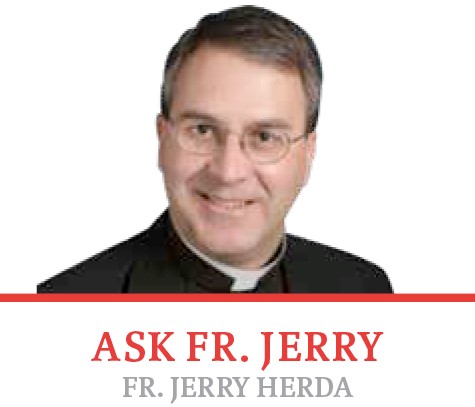Ask Fr. Jerry
What are some of the key requirements for a Catholic funeral, and what should family members be thinking about when planning one?
The Catholic Church has some very specific rules and requirements when it comes to a Catholic funeral, and at the same time, the Catholic Church gives great flexibility in how to do a funeral. Canon law states, “Deceased members of the Christian faithful must be given ecclesiastical funerals according to the norm of law.” (Canon 1176)
Every Catholic is entitled to a funeral. The canon goes on to state there are three main reasons for a funeral — spiritual support for the deceased, honoring their body and bringing solace of hope to the living. A funeral is designed to pray for and honor the deceased, but also is designed to bring comfort and hope to family and friends. This canon furthermore states, “The Church earnestly recommends that the pious custom of burying the bodies of the deceased be observed; nevertheless, the Church does not prohibit cremation.” While cremation is permitted, the scattering of ashes is not. It is also required by the Church that the cremated remains be permanently placed in a sacred place, not be kept in an urn at home.
The next canon states, “A funeral for any deceased member of the faithful must generally be celebrated in his or her parish church. Any member of the faithful or those competent to take care of the funeral of a deceased member of the faithful are permitted to choose another church for the funeral rite with the consent of the person who governs it and after notification of the proper pastor of the deceased.” (Canon 1177) The normal way a funeral is celebrated is in the home parish of the deceased with a funeral Mass, but the Church does give flexibility. A funeral service in a funeral home is permitted. However, it is very disappointing when a faithful Catholic dies and the family who is not as faithful decides not to do a funeral Mass. I strongly recommend that you express your wishes for a funeral Mass to your loved ones and even consider putting it in writing.
Canon 1181 makes a very powerful statement. “There is to be no favoritism toward persons in funerals and that the poor are not to be deprived of fitting funerals.” In the Catholic Church, everyone is entitled to a funeral with a few rare exceptions laid out in Canon Law. Whether a person is rich or poor, sinner or saint, they are entitled to have a funeral.
The biggest challenge regarding funerals is the fact that people are afraid to talk about their own death. We are all going to die. It is OK to plan your own funeral and pick out the songs and readings you would like. Meet with a funeral director to pre-plan. Buy a cemetery plot or a crypt. Talk to your family and tell them what you want.
Finally, when it comes to planning a funeral, whether it is pre-planning your own or planning at the moment when your loved one dies, remember that our ultimate goal here on earth is to make it to heaven. A funeral is a celebration that the deceased is now going home to the Lord. Let us rejoice and be glad for they have found their eternal reward.

